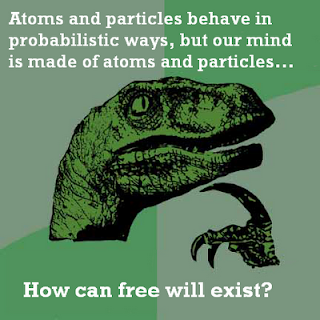General Chat / The logical and emotional problem of evil.
-
 18-August 11
18-August 11
-

 Midnight Aurora
Offline
Midnight Aurora
Offline
Sorry no one responded to you in two hours. Please stay on the line--your call is important to us.hahaha...well thats the last input i give to this topic since im fucking invisible!
-

 Top Gun
Offline
Top Gun
Offline
On topic:

Discuss.
Because love exists. Love is the ultimate example of free will, because forced love is not love. -

 Liampie
Offline
Liampie
Offline
Because love exists. Love is the ultimate example of free will, because forced love is not love.
Define love. -

 AvanineCommuter
Offline
AvanineCommuter
Offline
i loce cornflakes. i did not choose to love cornflakes. therefore free will.
I thought free will = you have power to choose. If love is something that you can't choose, then how is that free will? If you love someone/something, you can't help it or you can't just wake up one day and say "today I'm going to love cornflakes". The predisposition to like a certain flavor present in cornflakes or the certain je ne sais quoi of another person can probably be contributed to chemical reactions and hormones and all that. -

IceKnight366 Offline
This is ridiculous. I'm done arguing about definitions with you.
I'm sorry you feel that we are arguing Cole. That is what the Encyclopedia of Philosophy says.Cole pretty much ended this thread with this, Ice.
Not at all RMM. If you would like to rationally look at my response to him instead of commenting
as if I never responded, feel free to respond to it.
So I believe that we have seen no good reason or evidence for the truth of the claim "God does not exist". Thus, the Theist is completely justified in their experience that God exists. Now, based on this experience, evidence is not necessary to know that God exists. But what about showing that God exists? Well, let me post the first argument (which just happens to be one of my personal favorites) for the existence of God. Just to set out any confusion from the get go, this argument can also be found in Dr. Craig's book "Reasonable Faith" on page 111. Now I have a lengthy version of this with over 25 scholarly sources, but somehow I don't think that people will have the patience to read it. So lets just start out here with the more shortened version:
Truth Journal
The Existence of God and the Beginning of the Universe
William Lane Craig
"William Craig earned a doctorate in philosophy at the University of Birmingham, England, before taking a doctorate in theology from the Ludwig Maximiliens Universitat-Munchen, West Germany, at which latter institution he was for two years a Fellow of the Alexander von Humboldt-Stiftung. He is currently a visiting scholar at the Universite Catholique de Louvain. He has authored various books, including The Kalam Cosmological Argument, The Cosmological Argument from Plato to Leibniz, and The Problem of Divine Foreknowledge and Future Contingents from Aristotle to Suarez, as well as articles in professional journals like British Journal for the Philosophy of Science, Zeitschrift fur Philosophische Forschung, Australasian Journal of Philosophy, and Philosophia."
The Origin of the Universe.
Have you ever asked yourself, “Where the universe came from?” Why anything exists instead of just nothing. Typically Atheists have said that the universe is just eternal, and uncaused. But philosophy, as well as discoveries in modern astronomy and astrophysics have called this assumption into question. The astrophysical evidence indicates that the universe began to exist in a great explosion called the “Big Bang” about 15 billion years ago. Moreover, the origin it posits, is an absolute origin out of nothing. For not only all matter and energy, but physical space and time themselves came into being at the initial cosmological singularity, which marks the boundary at space and time.
Now this tends to be very awkward for the Atheist. For as Anthony Kenny of Oxford University urges, “A proponent of the Big Bang theory, at least if he is an Atheist, must believe that the universe came From Nothing, and By Nothing.” But surely that doesn’t make sense. For such a conclusion, is in head-on collision with the most successful ontological commitment in the history of science, namely, out of nothing, nothing comes. So why does the universe exist, instead of just nothing? There must have been a cause, that brought the universe into being. We can summarize the argument as thus follows:
Premise 1:“Anything that begins to exist has a cause.”
Premise 2: “The universe began to exist.”
Conclusion: “Therefore the universe has a cause.”
From the very nature of the case, as the cause of space and time, this cause must transcend space and time, and therefore must exist timelessly, and spaciously. This transcendent cause must therefore be immaterial and changeless. Since anything that is timeless, has to be changeless, and anything that is changeless has to be immaterial, since material things are constantly changing, at least on the molecular and atomic level. Such a cause must be beginning less and uncaused since there cannot be an infinite regress of causes. This entity must be unimaginably powerful since it created the universe without any material cause; it created the matter and energy itself.
Moreover, this cause must be personal. For how else could a timeless cause give rise to a temporal effect like the universe? If the cause were an impersonal set of necessary and sufficient conditions, than the cause could never exist without the effect. If the cause were timelessly present, than the effect would be timelessly present.
Ex: The cause of water freezing is the temperature dropping below 32º Celsius. However, if the temperature had been below 32º from eternity, than any water that would have existed would have been frozen from eternity.
The only way for the cause to be timeless and for the effect to begin to exist in time, is for the cause to be a personal agent, who freely chooses to create an effect in time without any prior determining conditions. And thus we are brought not just to a transcendent cause of the universe, but to its personal creator. Isn’t it incredible that the Big Bang theory thus confirms what the Christian Theist has always believed; that in the beginning, God created the universe. So which do you think is more plausible; that the Theist is right, or that the universe, without even so much as the potentiality of its existence, popped into being uncaused, and out of absolutely nothing.
Thus, we are left with a timeless, spaceless, changeless, immaterial and personal cause of the universe.
I trust that this will be an exciting and stimulating conversation, and I look forward to talking to you all with open minds, and open hearts. -

RMM Offline
of course there are questions that can't be answered. we don't know what caused the universe. scientists call it the 'god effect' or something like that. we don't know and never will. to say it was some bearded man in the clouds is beyond logic. and to say that this bearded man in the clouds let us know is even further beyond logic. just because we don't know something doesn't mean we need to make up some bullshit reason. science has always given reason for the miraculous events in the bible and always will. religion is slowly backing up towards the cliff. i hope it falls sometime in my lifetime, at least in the US, so we can move on and advance ourselves. i do think that most of our 'morals' come from religion and whatnot, but religion is out of hand. it's a mental disorder. imagine the world without religion. john lennon is god. -

 AvanineCommuter
Offline
So if a god does exist, which one should we believe in? What makes your Christian god the truth?
AvanineCommuter
Offline
So if a god does exist, which one should we believe in? What makes your Christian god the truth? -

 Midnight Aurora
Offline
Midnight Aurora
Offline
We have seen no good reason or evidence for the truth of the claim "God does exist." Thus, the Atheist is completely justified in their experience that God does not exist....
So I believe that we have seen no good reason or evidence for the truth of the claim "God does not exist". Thus, the Theist is completely justified in their experience that God exists.
...[/i] -

 K0NG
Offline
K0NG
Offline
Lennon, duhhhh.So if a god does exist, which one should we believe in? What makes your Christian god the truth
I'm pretty sure that he shaved just prior to The White Album.to say it was some bearded man in the clouds is beyond logic.
-

 dr dirt
Offline
Maybe our galaxy is like an atom in a bigger world, and the universe is like a molecule. some real Horton Hears a Who kind of shit.
dr dirt
Offline
Maybe our galaxy is like an atom in a bigger world, and the universe is like a molecule. some real Horton Hears a Who kind of shit. -

 Top Gun
Offline
Top Gun
Offline
So if a god does exist, which one should we believe in? What makes your Christian god the truth?
Because God is still alive. Unlike others.
Question: How do you guys explain speaking in tongues? If you don't know, speaking in tongues is the evidence of the holy spirit(which is God). I've grown up in pentecostal churches and I've seen it so many times. -

 SSSammy
Offline
SSSammy
Offline
exactly. i was just being an asshole about saying what you said.I thought free will = you have power to choose. If love is something that you can't choose, then how is that free will? If you love someone/something, you can't help it or you can't just wake up one day and say "today I'm going to love cornflakes". The predisposition to like a certain flavor present in cornflakes or the certain je ne sais quoi of another person can probably be contributed to chemical reactions and hormones and all that.
hey top gun.
ever heard of a self fulfilling prophecy?
basically it is where someone wants something to happen so much, it happens. in this particular situation, your buddies down at the myth lab have convinced themselves that they have the ability to speak in tongues and experience god. so, they want it so much, it they force themselves to do it without realising.
and god is still alive unlike others? what? -

 Top Gun
Offline
Actually I've seen it plenty of times where people who did not necessarily want to speak in tongues, become so overwhelmed by God's presence that they actually start speaking in tongues.
Top Gun
Offline
Actually I've seen it plenty of times where people who did not necessarily want to speak in tongues, become so overwhelmed by God's presence that they actually start speaking in tongues.
Buddha is dead, Muhammad is dead, etc. But God is alive. That's what I meant by that. -

 SSSammy
Offline
but i bet me as someone who doesn't take into such things would never speak in tongues. because i have not let god into my heart? because i'm trying not to? or do you have a different excuse?
SSSammy
Offline
but i bet me as someone who doesn't take into such things would never speak in tongues. because i have not let god into my heart? because i'm trying not to? or do you have a different excuse?
and i bet Zeus and all his buddies are still alive in greek mythology. your point is a very, very weak one. it's basically as bad as "god is real because he is." -

 Cole
Offline
Cole
Offline
Actually I've seen it plenty of times where people who did not necessarily want to speak in tongues, become so overwhelmed by God's presence that they actually start speaking in tongues.
Buddha is dead, Muhammad is dead, etc. But God is alive. That's what I meant by that.
Sorry, but this is probably the worst argument I've ever heard. Speaking in gibberish does not prove anything. Hundreds of pagan religions around the world "speak in tongues" too.
Buddha is dead, God is dead, Muhammad is dead, etc. But Zeus is alive.


